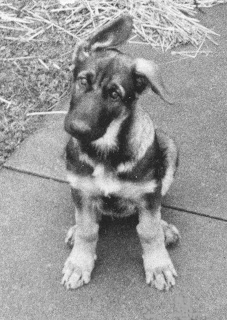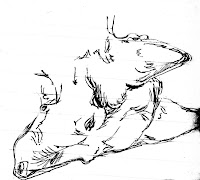
The grade of
E – "Marginally Failing"
A good friend and fellow academician recently sent me a brief email about the grade of
E. Because we are both equally sick to death of the
I just wanna get by, and the
you owe me attitudes of the students that skulk around college campuses these days, she thought I might find this grade amusing, on some perverted level. She was right.
The title of this blog, "The Letter E," makes me immediately think of Sesame Street and some of the shtick they have used over the decades to teach little kids the alphabet, numbers, colors, etc. I'm of the
Captain Kangaroo generation, and while I'm sure The Captain, Mr. Greenjeans, Bunny Rabbit, and Mr. Moose had some pretty lame ways of teaching things to my generation, I honestly don't remember them talking down to us the likes of Sesame Street and its distant cousin, that damnable, saccharine-besotted, wretched purple dinosaur, what's-his-name. Oh yeah, Barney. How

could I forget Barney?
Barney from Texas. Where else?
Anyway, it seems that the Sesame Street and Barney generations have been dumbed down ever further, if that's possible. Now, some universities are awarding their undergraduates' feeble non-efforts with the grade of
E. The
E is defined, by at least one university (which will remain nameless but you can find them
here) as "Marginally Failing." Marginally failing? That sounds as improbable as being just a wee bit pregnant. What does it actually mean to be a marginal failure? Think about it – how does one marginally fail? I don't think one can marginally fail in the physics of this Universe. One word negates the other, nullifying both, making the term meaningless. Perhaps that's the point.
But wait. It gets worse. Take a look at the grade inflation from this same school, which it proudly and publically displays on its website for all to marvel at:
Grade
|
Grade Point
|
Per Cent Range
|
Description
|
A+
|
9
|
90-100
|
Exceptional
|
A
|
8
|
80-89
|
Excellent
|
B+
|
7
|
75-79
|
Very Good
|
B
|
6
|
70-74
|
Good
|
C+
|
5
|
65-69
|
Competent
|
C
|
4
|
60-64
|
Fairly Competent
|
D+
|
3
|
55-59
|
Passing
|
D
|
2
|
50-54
|
Marginally Passing
|
E
|
1
|
(marginally below 50%)
|
Marginally Failing
|
F
|
0
|
(below 50%)
|
Failing
|
Apparently, this isn't a fluke. This is turning into the norm. Even though I am not currently teaching, this trend still disturbs me. It should disturb everyone. Granted, the inclination to inflate (or deflate) grades is not new. God forbid instructors should fracture some little darling's ego with the truth: you suck at (insert subject here). But this grade of
E – while it's not new, it's news to me.
So that we might get

some perspective, we're now going to travel in the
WABAC (pronounced wayback) Machine to "when I was in college," so bear with me and pay attention. This is important.
Back in the dark ages when the earth was still cooling (I first went to college in the early 70s), an
A really meant something. It meant your performance was exceptional and you were well on your way to mastering a subject. An
A was extremely rare, hard-earned, a thing of beauty, and a joy forever. An
A was definitely a combined effort of student and professor, each working in collaboration -- the student there to learn and the professor able and willing to help make that happen. An
A's numerical equivalent (be it
A-,
A, or
A+) was somewhere between 90 and 100. Everyone concerned instinctively understood these numbers and letters and
they made sense.†
B never found its way into the 90s.
B lived strictly in the realm of the 80s. Neither did a
B equate to something somewhere between a 70 and a 75. That was reserved for
C. A
B was right there next to an
A, and one worked bloody hard to get it too. Not quite as rare as an
A, it was still something to be proud of and still involved significant hard work, dedication, and discipline – both on the part of the student and the professor.
C never meant "fairly competent." That's another one of those nonsense phrases. A
C hovered around 75, its plus and minus siblings nearby. It used to mean unremarkably average. Simply put, you wouldn't want your doctor, your lawyer, your veterinarian, your CPA, or your
President to have a C average. Not if you were given a choice.
A
D -- well, that was a
Disgrace, something you hid from parents and friends alike because it was a shameful admittance of some inadequacy on your part. A
D used to mean
you're barely getting this stuff,
you're definitely not college material, and
we're not afraid to tell you, because our reputation as an institution of higher learning is far more important than your drop-in-the-bucket tuition or the sweet deal we just cooked up with (insert a brand name or military contract of your choice here). Getting a
D was scandalous and solicited outrage from tuition-paying parents towards their
kids,
not towards the professors. A
D used to mean,
you should consider ditch digging or table waiting as a career move. In today's world, one might instead suggest
running for
political office or working for the
TSA.
If you accumulated just a couple of
D's you were invited not to return to college. Sure, there was academic probation but there was a strict limit on the number of crappy grades you could accumulate before you were ushered off campus. For good. Period. End of story. There was no revolving door greased by more tuition money thrown at the scam of remediation. (Don't know a noun from a hole in the ground? Wouldn't know a cosine from a 'for rent' sign? That's what high school is for. Go back. Tell them you want a do-over. Make them do
their jobs! And please quit coming to college expecting to get a high school education.)
Back in the day, not really that long ago, the first two years of college classes were designed to beat you senseless with enough material to make your head swell and your eyes bleed. Classes were rigorously designed with the singular aim of identifying and weeding out the unintelligent, unintelligible people, the slackers, the dim-wits, and the droolers from those with brains and more than a little potential. Students weren't remediated, they weren't indulged, and they weren't entitled to anything. Shitty performances resulted in shitty grades that were easily understood (
D = you're dumb;
F = you're really really dumb; get a napkin and wipe your chin), and neither was tolerated for long. No one ever got an
E, because no one could have even imagined such tripe as "Marginally Failing." The alphabet of college grades skipped a letter and dropped you from the
D of
you really can't cut it to the
F of
go live the rest of your uninspiring life in your parents' basement. Even in the lingo of the post-modern, which has the deliberate if dubious intentionality to be obscurely unintelligible, purposely incomprehensible, and affectingly effusive, the mashing of the words
marginal and
failure stretches the limits of the pomo dislexicon.
Seriously, consider this: if synonyms for competent include
knowledgeable,
proficient and
skilled, and fairly means
reasonably, one has a hard time believing a
C, which truthfully corresponds to unexceptionally average, is now instead equivalent to reasonably knowledgeable, proficient, and skilled. A
D, which has morphed into meaning "marginally passing," (the parasitic twin of "marginally failing") used to mean either
try a lot harder or
get out of the way and make room for someone who not only has the capacity to learn but wants to learn.
This
E grade. I'm still working it out. But in its current incarnation it seems to be an amalgamation of student ineptitude, administration acquiescence, professor apathy, and our culture's aversion to acknowledge the truth.
It's no exaggeration to state that most students today come to college woefully unprepared and uninspired. Their eyes and voices are as hollow as their minds. What the system has done to them, what their parents have done to them, what their teachers have done to them, and what they have done to themselves -- to be this vacant-- is for another blog. But void, vacant, and hollow they are. To them, I am sure, an
E makes perfect sense. Whatever.
Then we have the administrators. They're so busy trying to cut big money deals with corporations so they can keep their institutions' doors open they haven't time to worry about what goes on in the trenches, so some made-up grade like an
E isn't even on their radar. Most college administrators are some version of education majors anyway, so they're used to making shit up. It's part of the degree. So the
E goes unnoticed as one more meaningless marker on a transcript. Grades are all arbitrary anyway, aren’t they?
And professors are either so sick of the whining coming from students and parents alike that they have resorted to make-believe grades as an inside joke, a grade as devoid of meaning as their students' efforts; or they themselves are part of that Barney generation where handing out phony grades that make students feel better is easier than making the Herculean effort to pry something out of their lifeless charges. It's hard, thankless work, struggling to inspire students to disengage themselves from their i-gadgets and reengage with something besides themselves. Some professors have cynically concluded, and rightfully so, that it's simply no longer worth the effort.
I've decided that this
new grade of
E most likely stands for
equivocation and
evasion. It's truly an inspired misrepresentation, forged from the pits of pop-psychology, designed to non-tell the receiver he's simply dumb as dirt but academia hasn't the stomach to tell him.
Super Dee Duper!
Whatever.
† In his 1993 article Mark W. Durm indicates that Mount Holyoke, in 1897, developed the first
letter grading system. Check it out. They'd be rolling on the floor over the give-away grades used today, but look at that E!
— A: excellent, equivalent to 95 to 100 percent
— B: good, 85 to 94 percent
— C: fair, 76 to 84 percent
— D: barely passed, 75 percent
—
E: failed, below 75 percent
“The percentage equivalents were tougher than most systems today. The next year, Mount Holyoke tightened them further, making a B from 90 to 94 percent, a C 85 to 89 percent, a D 80 to 84 percent, an E 75 to 79 percent, and adding a sixth grade, the soon-to-be-famous F, which was anything below 75.”
Leave it to women to expect excellence. Yeah for
Mount Holyoke. You go, girls! For those who followed the link to the un-named university above, shame on you,
York University in Canada. It's only a matter of time before your wretched
E trickles down to the

States.
Blame Canada!






























